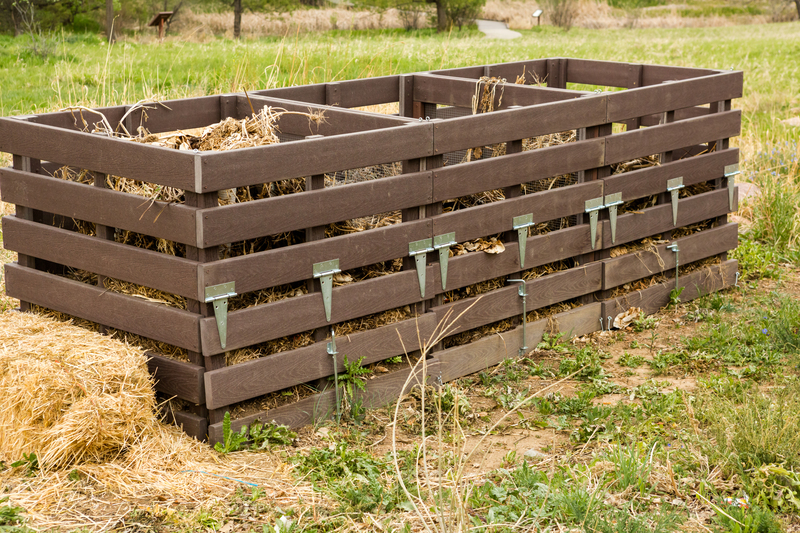Adopt These Waste Prevention Practices for a Healthier Home
In today's era, waste reduction and waste prevention practices are more than just buzzwords--they are essential for a cleaner, greener, and healthier household. Not only does minimizing waste boost environmental well-being, but it also leads to cost savings, improved indoor air quality, and a happier, less cluttered lifestyle. This comprehensive guide explores actionable and achievable waste prevention techniques for households, helping you pave the way toward a sustainable and healthy home environment.
Why is Waste Prevention Important for Your Home?
Adopting waste prevention practices in your daily routine brings numerous benefits. From protecting our planet to fostering a safer home for your family, the importance of reducing waste cannot be overstated.
- Environmental Protection: Cutting down on waste eases the strain on landfills, reduces pollution, and conserves vital resources.
- Financial Savings: Reducing waste often translates into buying less, reusing more, and cutting energy costs.
- Improved Indoor Air Quality: Certain waste materials can emit harmful toxins. Managing waste correctly can keep your indoor environment healthier.
- Less Clutter, More Space: Waste reduction means a neater, more organized home.

Top Waste Reduction Practices for Families
1. Rethink Your Shopping Habits
The journey towards a zero-waste lifestyle starts even before you bring items home. Adopting waste-preventing consumer habits can significantly reduce the volume of waste generated. Here's how:
- Buy in Bulk: Purchasing pantry staples and household products in bulk decreases packaging waste. Bring your own reusable containers whenever possible.
- Choose Reusable Over Disposable: Invest in items that last, such as stainless steel water bottles, cloth napkins, and washable shopping bags.
- Purchase Only What You Need: Overbuying leads to excess, which frequently ends up as waste. Plan meals and make shopping lists to avoid impulse purchases.
- Opt for Minimal Packaging: When possible, select items with the least or recyclable packaging. Support brands that prioritize eco-friendly methods.
2. Embrace Composting
Food scraps and yard trimmings make up a significant portion of household waste. Instead of allowing them to rot in a landfill, start composting! This natural process turns organic materials into nutrient-rich soil, perfect for gardens and landscaping.
- Set Up a Bin: You can compost in your backyard or use a compact indoor compost bin.
- Know What's Compostable: Fruit and vegetable peels, eggshells, coffee grounds, and yard waste are all ideal for composting.
- Benefits: Composting reduces landfill waste, curbs methane emissions, and enriches your soil--eliminating the need for chemical fertilizers.
3. Reduce Food Waste
According to the Food and Agriculture Organization, one-third of food produced globally is wasted. This is not only wasteful but also strains resources like water and energy. Preventing food waste is a core waste minimization practice for healthier homes.
- Plan Meals: Organize your meals for the week based on what you already have at home, helping avoid spoilage.
- Store Food Properly: Learn best practices for storing produce, grains, and dairy to keep them fresher longer.
- Revive Leftovers: Get creative with leftovers--transform last night's dinner into lunch or a whole new dish.
- Understand Expiry Dates: Many 'best before' dates are just guidelines. Use your senses to determine edibility before discarding.
Practice Conscious Consumption
4. Minimize Single-Use Plastics
Plastic pollution is a global crisis, and single-use plastics are a large part of the problem. Adopting plastic waste prevention strategies at home is crucial.
- Use Reusable Bags and Containers: Always keep a reusable bag handy and swap out plastic wrap for beeswax wraps or reusable silicone covers.
- Say No to Plastic Straws: Use stainless steel or bamboo alternatives for your drinks.
- Purchase in Bulk: Reduce the amount of packaging required by purchasing larger quantities or bringing your own containers to refill stations wherever available.
5. Choose Eco-Friendly Cleaning Solutions
Many store-bought cleaners come in plastic bottles and contain harmful chemicals. Switching to environmentally-friendly cleaning options supports both waste reduction and healthier indoor air.
- Make your own cleaners using vinegar, baking soda, and lemon juice.
- Purchase concentrate solutions that can be diluted in reusable spray bottles.
- Look for cleaning products with minimal or recyclable packaging.
Extend the Life of What You Own
6. Repair and Repurpose Items
A staple of the waste prevention strategy is the "repair before replace" mentality. Before discarding broken or outdated items, see if they can be repaired or repurposed.
- Clothing: Patch up or alter clothing instead of throwing it away. Learn basic sewing skills or use a local tailor.
- Electronics and Appliances: Many household gadgets can be fixed at repair cafes or service centers, extending their lifespan dramatically.
- Furniture: A bit of creativity can turn old furniture pieces into something completely new--like turning a ladder into shelves.
7. Practice Product Swapping and Sharing
Often, items you need are only for temporary use. Opt for borrowing, renting, or swapping instead of buying new.
- Libraries and local sharing initiatives let you borrow books, tools, toys, and even kitchen equipment.
- Neighborhood "Buy Nothing" groups are a fantastic resource for exchanging goods within your community, preventing waste and building connections.
- Rent equipment for rare projects instead of purchasing; many hardware stores offer rental options for everything from tools to party supplies.
Make Recycling a Last Resort, Not the First Step
While recycling is crucial, it should not be the first line of defense against waste. Many materials are not infinitely recyclable, and improper recycling often leads to contamination.
- Sort Waste Properly: Learn your local recycling guidelines--know what can and can't be recycled in your area.
- Clean Your Recyclables: Rinse containers to prevent food residue from harming the recycling process.
- Upcycle: Get creative with glass jars, tin cans, or cardboard. DIY crafts are fun and keep materials out of the waste stream.
Only recycle what truly belongs in your recycling bin. Prioritize reducing and reusing before tossing anything away.
Minimize Paper Waste in Your Home
- Go Paperless: Choose digital bills, bank statements, and subscriptions to cut down on paper clutter.
- Reuse Scraps: Use the backs of envelopes or other one-sided sheets for shopping lists or notes.
- Opt Out of Junk Mail: Register with services that remove you from unsolicited postal mail lists.
- Repurpose Packaging: Transform cardboard boxes into storage or craft projects.
Tackle Hazardous and E-Waste Responsibly
Dispose of Electronics Properly
Old electronics contain hazardous materials that can leak into soil and water if not disposed of correctly.
- Participate in e-waste recycling events and take old phones, laptops, and batteries to authorized collection points.
- Donate usable electronics to schools, nonprofits, or community centers.
- Wipe all data before disposal to protect your privacy.
Manage Household Chemicals Carefully
- Avoid stockpiling hazardous substances like paints, pesticides, and cleaners. Only buy what you need and store them safely.
- Utilize local hazardous waste collection programs--never pour chemicals down the drain.
Build a Culture of Waste Reduction at Home
Waste prevention is more effective when everyone participates. Building a household culture around zero waste living practices benefits your health and the planet.
- Educate Family Members: Teach children about recycling, reusing, and thoughtful consumption. Kids often love hands-on participation.
- Incorporate Fun Challenges: Set family goals for reducing weekly waste or composting more food scraps.
- Lead by Example: Demonstrate sustainable choices in your everyday life. Small actions add up to lasting habits over time.

Start Your Waste-Free Journey Today!
Simple Steps for Immediate Impact
- Conduct a home waste audit. Identify what you throw away most and target those areas first.
- Switch to reusable shopping bags and containers.
- Set up a compost bin for kitchen scraps.
- Repurpose or donate items that you no longer need.
- Share your journey and inspire others in your community.
Conclusion: Embrace Sustainable Waste Prevention for a Healthier Household
Building a healthy home starts with conscious actions. By incorporating these waste reduction techniques--from mindful shopping to composting, repairing, swapping, and careful disposal--you not only cut down on what goes to the landfill but also promote a safe, nurturing, and vibrant place to live. Adopting effective waste prevention practices for healthier homes is a journey--begin with one small step, and soon, your entire household will reap the benefits of a cleaner, greener lifestyle.
Remember: Every item you keep out of the waste stream is a positive choice for your family's health, your wallet, and the planet. So, start today and make your house a model of sustainable living.
Adopt these waste prevention practices for a healthier home--and inspire others to join you on the path to zero waste!